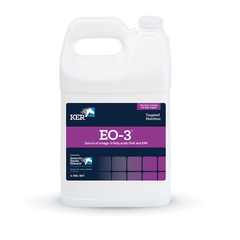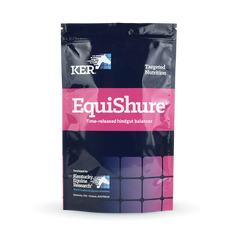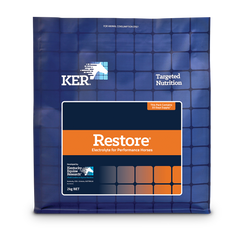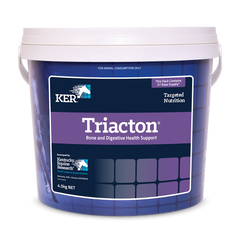Racehorses
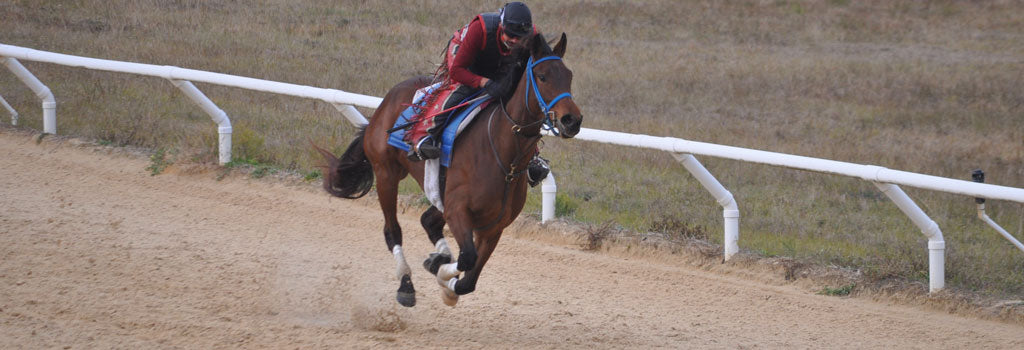
When it comes to nutritional requirements, racehorses are in a class of their own. The demands of race training put stresses on a horse's body above and beyond those normally encountered by most other performance horses.
Racing and the associated changes in diet and management can put racehorses at risk for problems such as degenerative joint disease, electrolyte imbalance, and digestive issues and resulting stable vices.
Which solutions are right for your stable?
Bone Food Plus® Mineral and vitamin supplement to support bone health. Bone Food Plus is formulated to supply equine diets with vital bone-building nutrients and supplies the essential building blocks to optimise bone development, health, and strength.
Race Recovery™ Racing Optimised Electrolyte. Powder is an innovative electrolyte supplement designed specifically for horses given furosemide. Research at Kentucky Equine Research (KER) found that horses given furosemide require additional supplementation following exertion to maintain optimal electrolyte balance.
EO-3™ Concentrated direct source of DHA and EPA omega-3 fatty acids. EO-3 is a rich source of the long-chain omega-3 fatty acids DHA and EPA in a palatable liquid form. EO-3 can be fed to all classes of horses including foals, breeding stock, and performance horses to improve the critical ratio of omega-3 to omega-6 fatty acids in the diet.
EquiShure® Time-released hindgut balancer. EquiShure promotes normal digestive function by aiding in the maintenance of an optimal hindgut environment and is designed for horses suspected of suffering from or that are at risk of developing hindgut acidosis.
Gold Pellet® The ultimate vitamin, mineral and amino acid supplement for horses. Gold Pellet has been scientifically formulated to contain essential nutrient levels to meet requirements for work or growth, and is designed to complement a traditional diet of grains and roughage.
Hemabuild® Blood builder for horses. Hemabuild is a vitamin B and trace mineral supplement for stressed horses or horses in heavy training. Hemabuild can be useful as a pick-me-up for a sick or injured horse as well as persuading a picky eater to finish its feed.
Nano-E® Liquid natural-source vitamin E with superior bioavailability. Nano-E is a revolutionary natural-source vitamin E supplement for horses. Liposome encapsulation and nanodispersion ensures rapid and superior bioavailability for all horses.
Nano-Q10™ Coenzyme Q10 antioxidant for horses. Coenzyme Q10 is a powerful antioxidant, protecting cells from highly reactive chemicals called free radicals that can damage cells and their DNA. Nano-Q10 features advanced nanotechnology to create a rapidly available and absorbed source of Coenzyme Q10 that has been shown to be 3X more bioavailable than powdered ubiquinone.
Neigh-Lox® Antacid and coating supplement for horses at risk of gastric ulcers. Prolonged exposure of the stomach to gastric acid can cause damage to the stomach lining, resulting in a painful condition for the horse. Neigh-Lox contains a combination of rapidly acting antacids.
Restore® Electrolyte for performance horses. A scientifically formulated electrolyte supplement designed to match the composition of horse sweat. Restore is designed to replenish electrolytes in any situation where horses may have sweated, particularly after training, travel, racing, competition, or during hot weather.
Restore® Paste Buffered oral electrolyte paste for horses that sweat. A carefully formulated electrolyte paste to match the composition of sweat. Restore Paste is an easy-to-administer product that includes a buffering agent designed to support gastrointestinal comfort in horses.
Synovate HA® Premium joint supplement. Synovate HA delivers high molecular weight sodium hyaluronate in an easy-to-use liquid.
Triacton® Bone and digestive health support. Triacton is a research-proven, triple-action supplement designed to improve bone density and support digestive health in horses.
Tips for the Nutritional Management of the Racehorse
- Deliver sufficient energy intake. The energy requirement of horses in race training is significantly higher than almost all other types of performance horses; forage alone cannot provide sufficient calories. Racehorses often need a large amount of supplemental feed (1-1.5% of the horse’s body weight).
- Provide appropriate nutrient intake. Hay and cereal grains are low in certain vitamins and minerals needed for optimal performance. If a fortified concentrate is not being fed as directed, or if straight cereal grains are fed, supplement to ensure optimal levels of nutrients are supplied.
- Replenish electrolytes. Electrolytes play key roles in transmission of nerve impulses and muscle contraction. Horses with insufficient electrolytes are at risk for earlier onset of fatigue and therefore have less stamina. Racehorses lose more electrolytes in daily training than the typical 2 ounces (60 g) of free-choice salt intake can replenish.
- Support muscle health and speed recovery. Muscle contractions during work lead to the production of free radicals, which can damage muscle cells. Certain nutrients act as antioxidants, reducing the risk of muscle damage and supporting improved recovery.
- Maintain digestive health. Horses that consume a high level of grain, are stabled without turnout, and undergo the stress of training and competition often end up with gastric ulcers, hindgut acidosis, signs of colic, and stable vices like cribbing.
- Promote soundness and longevity. Training and racing at high speeds can lead to significant wear and tear on joints. Even sound horses may exhibit shorter stride length due to minor discomfort.
- Maintain bone quality. KER research shows stall confinement can lead to bone demineralization and weakening in as few as two weeks. Additionally, horses initially entering race training will typically lose bone density during the first few months of training, potentially putting them at increased risk for training setbacks such as bucked shins as they start fast work.
Related collections
Growing Horses. Growing horses can encounter various management situations that may derail proper growth, such as long periods of stalling, poor pasture, feeding below the recommended amount of formulated feed, and even overfeeding (or overconsumption of calories). In these situations careful nutritional management and supplementation may aid in supporting healthy growth progress. See the Growing Horse collection.
Broodmare. Various aspects of pregnancy and foaling can be supported and, in some cases, improved through specific nutritional support. See the Broodmare collection.
Breeding Stallion. Breeding stallions require a carefully balanced diet to maintain optimal body condition and fertility. Certain aspects of stallion reproduction have been shown to be improved by supplementation. See the Breeding Stallion collection.
Special Needs. Targeted support for horses with specific medical issues. See the Special Needs collection.
Learn More
- What Happens to the Skeleton During Early Training of Racehorses?
- Athletic Horses: Supplements to Maximize Bone Health
- Omeprazole and Calcium Digestibility: What Horse Owners Should Know
- Feeding Horses Before Exercise: What to Feed and When?
- Equine Fitness: How to Build Muscle
- Antioxidant Use in Equine Athletes with Muscle Fatigue, Damage
- Choose Natural Vitamin E for Exercising Horses
- An Introduction to Coenzyme Q10 for Athletic Horses
-
Poor Racing Performance Due To Equine Asthma
- Omega-3s and Inflammation in Athletic Horses
- Maintaining Joint Health in Horses



